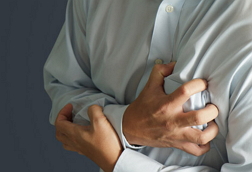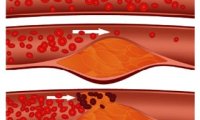 In the human body, each part is important, but when it comes to the heart, you need to be especially careful here. And in today's article we will talk about angina pectoris, or rather, these will be the most popular questions. People who have ever faced with this problem would be curious to know such answers:
In the human body, each part is important, but when it comes to the heart, you need to be especially careful here. And in today's article we will talk about angina pectoris, or rather, these will be the most popular questions. People who have ever faced with this problem would be curious to know such answers:
1. Why does angina arise, what is its cause?
This is because the vessels are clogged or tapered, there is a lack of oxygen and this leads to sharp pain in the heart. It must be said that atherosclerotic plaques exist in almost every person; the whole question is their size and how much they are capable of disturbing the inflow of blood into the myocardium. Significant plaques are considered that cover the lumen of the vessel by more than 50%, although it is possible to have it even with smaller plaques or even in their absence, but this is still a rarity.
The very mechanism of the appearance of pain is explained by the accumulation in the heart cells of toxic substances that are formed during the work of the heart in conditions of oxygen starvation. The second theory is that pain arises from the spasm of these very coronary arteries.
2. Under what conditions does angina develop?
The most characteristic provoking factor of pain is physical activity. Patients clearly note the connection of the occurrence of pain in the chest, a certain characteristic, which will be described later, with accelerated walking, climbing the steps, and so on. This is due to the fact that under these conditions the demand for myocardium in oxygen sharply increases, and the narrowed vessels are not able to provide sufficient capacity.
For provoking an attack of angina there may be other reasons that require the heart to work hard, such as emotional stress, in which there is an increase in heart rate and blood pressure rise or simply hypertensive crisis. In some cases, cold, more often frosty air, especially if the patient immediately leaves a warm room, can lead to spasm of the arteries feeding the heart. This form even has its name "cold angina".
In rare, far-reaching cases, it generally may occur at rest, this usually occurs with exacerbation of the disease or MI, but even in these cases, the load will intensify this pain.
3. How is it manifested?
It is primarily a pain in the chest, mainly behind the breastbone, sometimes it gives (irradiates) to the left arm, shoulder, shoulder blade, lower jaw. For this pain, communication with physical activity is mandatory. It feels normally pressing or baking. It is never stitching, shooting or cutting. The latter types of pain are more typical for musculoskeletal pain.
If you have pain in the chest of the stitching, which also depends on the position of the body or is strengthened by tilting, moving the hand, then you can be calm, the probability that this heartache is practically zero. Pain in diseases of the musculoskeletal system can indeed be extremely unpleasant and significantly worsen the quality of life of patients, but it is not life-threatening, even if there will be a whole day.
4. How long can angina last and what can a prolonged attack lead to?
It cannot last more than 20-30 minutes, since if this occurs, then it will already be about MI. The average attack lasts about 5 minutes. Usually, the pain passes on its own after the physical activity ceases.
Patients usually know how much they endure a standard attack of pain, and can be guided, whether this attack is mediocre or this is something new and requires the recourse for medical help. For example, if yesterday the episode lasted two minutes, and today it is five times longer, then this may mean that some changes have occurred and you cannot just leave it.
Knowing that it cannot last for hours and is associated with physical activity, doctors can distinguish pains of different origin from these two characteristics. Of course, it is necessary to make a reservation that sometimes in case of a non-typical course of the disease, to establish a diagnosis, having the results of even all known analyzes and studies in the world, it can be difficult. At the same time, for the diagnosis of angina pectoris in the classic pain syndrome, it is enough for 5 minutes of communication with the patient and nothing else. Any patient should know that they have five to seven minutes to eliminate pain, in the case of pain, urgently need to call an ambulance.
5. Why sometimes the attack passes independently, and sometimes it is necessary to take medications?
With stress the number of heart rate and blood pressure increases, which leads to a sharp increase in myocardial oxygen demand, the delivery of which cannot be provided due to the narrowing of the artery feeding the heart. The heart lets know about this pain syndrome, which causes the patient to stop.
When resting, the pulse becomes more rare, blood pressure decreases, hence the myocardial oxygen demand becomes smaller and even the affected vessel is able to provide this minimum. Over time, with frequent attacks, it is as if "training" the heart to oxygen starvation and the load threshold may become higher.
Also often there is such a phenomenon as "pacing" when the first attack occurs, for example, after 100 steps of walking, after rest the next episode arises after 500 steps and further pain during the day cannot be disturbed at all. The attack can last longer if, after stopping, the patient experiences stress on the background of pain, which maintains a high pulse and pressure or an artery spasm occurs. In this case, there is no reduction in the load on the heart, and to remove the pain in this case can only vasodilator drug nitroglycerin, taken under the tongue.




